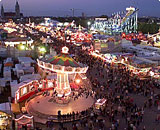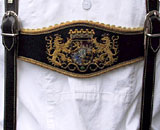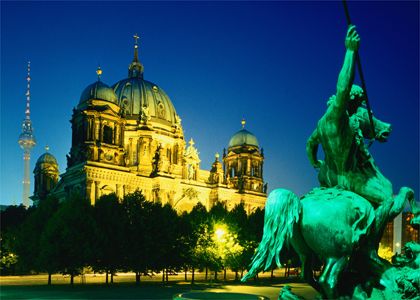Germany wears its riches well: elegant big-city charm, picture-postcard small towns, pagan-inspired harvest festivals, a wealth of art and culture and the perennial pleasures of huge tracts of forest, delightful castles and fine wine and beer are all there for the enjoying. Germany's reunification in 1990 was the beginning of yet another chapter in Germany's complex history. No visitor will remain untouched by this country's past and the way it affects the nation today.
OKTOBERFEST IN MUNICH
 Most Oktoberfests in the United State try to emulate, even in a small way, or for at least to cash in on the name, of the most famous Oktoberfest in the world. The Munich Oktoberfest is the largest German "Volksfest" (folk festival) and the only one bearing the name "Oktoberfest" which functions somewhat like a trademark. It promises the world's biggest good-time affair, attended by millions of thirsty souls from all over the globe, and takes place on the "Theresienwiese" with its giant beer tents, where buxom beer maidens serve the precious brew by the liter in large steins, where thirty-piece Bavarian bands rock the thick air, and where there's no end to singing "them old time drinking songs."
Most Oktoberfests in the United State try to emulate, even in a small way, or for at least to cash in on the name, of the most famous Oktoberfest in the world. The Munich Oktoberfest is the largest German "Volksfest" (folk festival) and the only one bearing the name "Oktoberfest" which functions somewhat like a trademark. It promises the world's biggest good-time affair, attended by millions of thirsty souls from all over the globe, and takes place on the "Theresienwiese" with its giant beer tents, where buxom beer maidens serve the precious brew by the liter in large steins, where thirty-piece Bavarian bands rock the thick air, and where there's no end to singing "them old time drinking songs."
The first Oktoberfest was actually part of a marriage celebration when, in October of 1810, Bavarian King Max Joseph gave a big time wedding for Crown Prince Ludwig, later to become King Ludwig I, with the Princess Therese von Sachsen-Hildburghausen. It culminated with a series of horse races and gave rise to the tradition of the October festival, and in the following year, became an annual affair commemorating this grand wedding forevermore. The Oktoberfest we know today, evolved over time and incorporated a number of different traditions.
In the 18th century, horse races, once so popular, were disappearing. Franz Baumgartner, corporal of the national garde, horse lover and owner of a good race horse himself, thought of a way to revive the races. Why not make horse races a part of the marriage celebration! The story goes that one Major Andrä Dall'Armi was designated to lead a delegation of officers of the Guard to suggest it to the King. King Max Joseph was delighted.
 Five days after the royal wedding, on October 17, a festival including the horse races, was held on the meadow in front of the Sendlinger Tor, one of Munich's many gates. The royal family, the royal court and the city magistrate were present and the citizens of Munich were invited to attend the festivities. The festival was such a success that it was decided to repeat the horse races in the following year. The Guard cavalry is said to have celebrated accordingly and requested that the race grounds be named "Theresienwiese" in honor of the crown princess. With this began that part of the Oktoberfest tradition--the present-day location--referred to as "d' Wies'n" (the meadow). In 1811 a big agricultural fair was added to the races and by 1818 the first performers and beer pub owners participated. Though the horse races were removed in 1938, many other traditions survived, which made the "Oktoberfest" not only a tourist attraction, but also a door to learning something about the German region of Bavaria and its people.
Five days after the royal wedding, on October 17, a festival including the horse races, was held on the meadow in front of the Sendlinger Tor, one of Munich's many gates. The royal family, the royal court and the city magistrate were present and the citizens of Munich were invited to attend the festivities. The festival was such a success that it was decided to repeat the horse races in the following year. The Guard cavalry is said to have celebrated accordingly and requested that the race grounds be named "Theresienwiese" in honor of the crown princess. With this began that part of the Oktoberfest tradition--the present-day location--referred to as "d' Wies'n" (the meadow). In 1811 a big agricultural fair was added to the races and by 1818 the first performers and beer pub owners participated. Though the horse races were removed in 1938, many other traditions survived, which made the "Oktoberfest" not only a tourist attraction, but also a door to learning something about the German region of Bavaria and its people.
The Oktoberfest is now celebrated in September, because the chilly Bavarian October winds blowing from the Alps, can surprise with an early cold and snow. The 16-day Fest always starts on a Saturday in September and ends on the 1st Sunday in October. Over time certain rituals evolved which are followed from year to year.
For the Opening day ceremonies, promptly at 11 a.m. a parade enters the grounds on the Wies'n headed by the Münchner Kindl--the little Munich city's coat of arms. The mayor arrives in a festive coach followed by civic dignitaries and horse-drawn brewer's carts decorated with flowers. This colorful ceremony with elaborate floats, beer bands and men, women and children wearing traditional costumes (lederhosen and dirndls) dates back to 1887. More than 7,0000 people participate in the four-mile long parade.
Don't miss it!

|





 View movies!
View movies! 
